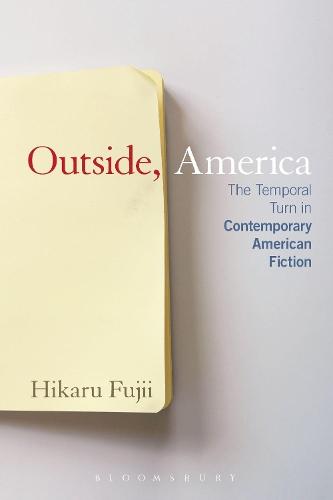Overview
The idea of the ""outside"" as a space of freedom has always been central in the literature of the United States. This concept still remains active in contemporary American fiction; however, its function is being significantly changed. Outside, America argues that, among contemporary American novelists, a shift of focus to the temporal dimension is taking place. No longer a spatial movement, the quest for the outside now seeks to reach the idea of time as a force of difference, a la Deleuze, by which the current subjectivity is transformed. In other words, the concept is taking a ""temporal turn."" Discussing eight novelists, including Don DeLillo, Richard Powers, Paul Theroux, and Annie Proulx, each of whose works describe forces of given identities—masculine identity, historical temporality, and power, etc.—which block quests for the outside, Fujii shows how the outside in these texts ceases to be a spatial idea. With due attention to critical and social contexts, the book aims to reveal a profound shift in contemporary American fiction.
Full Product Details
Author: Dr. Hikaru Fujii (Doshisha University, Japan)
Publisher: Bloomsbury Publishing Plc
Imprint: Bloomsbury Academic USA
Edition: NIPPOD
Dimensions:
Width: 15.20cm
, Height: 0.90cm
, Length: 22.90cm
Weight: 0.227kg
ISBN: 9781628925364
ISBN 10: 1628925361
Pages: 160
Publication Date: 23 October 2014
Audience:
General/trade
,
General
Format: Paperback
Publisher's Status: Active
Availability: Manufactured on demand

We will order this item for you from a manufactured on demand supplier.
Reviews
When the questing American hero, having lit out for the territories, runs out of space and discovers that there is no 'outside,' nothing exterior to the road-movie that is contemporary America-what happens then? Time changes; the self mutates; and the novel approaches a threshold between the literary mode of postmodernism and whatever lies ahead. This is what Hiraku Fujii tells us through his series of brilliant and revelatory readings of American novels since the late '80s. Not for the first time, it has taken an outsider to show Americans where to look and what to look for in their own imaginative literature. These novels-by Don DeLillo, Richard Powers, William Vollmann, Steve Erickson, Annie Proulx and others-will never look the same again. -- Brian McHale, Humanities Distinguished Professor, The Ohio State University, USA, and author of Postmodernist Fiction and Constructing Postmodernism Hikaru Fujii's Outside, America The Temporal Turn in Contemporary American Fiction is judicious, informed, perspicacious, and eye-opening. Meriting attention from both academics and the larger community of readers who value and appreciate illuminating criticism, it is a valuable contribution to our understanding of contemporary American fiction's achievements and prospects. -- David Cowart, Lousie Fry Scudder Professor of English, University of South Carolina, USA, and author of Don DeLillo: The Physics of Language and Thomas Pynchon and the Dark Passages of History A lively and gracefully written piece of work that pokes holes in the walls of Fortress America by examining an A-list of recent American writers and their works. Fujii shows that, only when those walls are transformed into membranes, and mutation becomes possible, can the recovery of individual freedoms be achieved. -- Ted Goossen, Professor of Japanese Literature and Culture, York University, Toronto, Canada
When the questing American hero, having lit out for the territories, runs out of space and discovers that there is no 'outside,' nothing exterior to the road-movie that is contemporary America-what happens then? Time changes; the self mutates; and the novel approaches a threshold between the literary mode of postmodernism and whatever lies ahead. This is what Hiraku Fujii tells us through his series of brilliant and revelatory readings of American novels since the late '80s. Not for the first time, it has taken an outsider to show Americans where to look and what to look for in their own imaginative literature. These novels-by Don DeLillo, Richard Powers, William Vollmann, Steve Erickson, Annie Proulx and others-will never look the same again. -- Brian McHale, Humanities Distinguished Professor, The Ohio State University, USA, and author of Postmodernist Fiction and Constructing Postmodernism Hikaru Fujii's Outside, America The Temporal Turn in Contemporary American Fiction is judicious, informed, perspicacious, and eye-opening. Meriting attention from both academics and the larger community of readers who value and appreciate illuminating criticism, it is a valuable contribution to our understanding of contemporary American fiction's achievements and prospects. -- David Cowart, Lousie Fry Scudder Professor of English, University of South Carolina, USA, and author of Don DeLillo: The Physics of Language and Thomas Pynchon and the Dark Passages of History A lively and gracefully written piece of work that pokes holes in the walls of Fortress America by examining an A-list of recent American writers and their works. Fujii shows that, only when those walls are transformed into membranes, and mutation becomes possible, can the recovery of individual freedoms be achieved. -- Ted Goossen, Professor of Japanese Literature and Culture, York University, Toronto, Canada
Author Information
Hikaru Fujii is Assistant Professor of English Department at Doshisha University, Japan.




